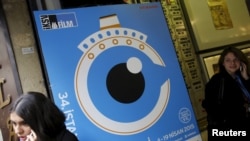Numerous filmmakers have withdrawn their films from the Istanbul Film Festival due to a deepening disagreement regarding government censorship.
The government is accused of forcing the festival organizers to withdraw a Kurdish documentary. The controversy has resulted in all festival competitions being cancelled.
At a time of peace efforts between the government and the Kurdish rebel group the PKK, the documentary Bakir was widely seen as one of the most anticipated films of the Istanbul film festival, with its rare access to PKK bases in Turkey.
But just hours before its screening, festival organizers received a letter from the Ministry of Culture warning them all documentaries made in Turkey need a screening certificate issued by the ministry. Festival director Azize Tan said they had no option but to withdraw the film.
Tan says it has been more than a decade since the ministry had enforced the regulation and only five documentaries of the 33 to be screened did not have the required certificate. The regulation only applies to Turkish films, and critics warn that enforcing the regulation gives the government the right to veto the screening of any film.
While the ministry did not name Bakir specifically, the timing of its intervention leaves most festival goers in little doubt the move was censorship.
In an open letter to the media, more than 100 filmmakers, including recent Cannes Palm D'Or winner Nuri Bilge Ceylan, condemned the move. Many withdrew their films from the festival, and in protest to the government restricitons, the festival canceled all competitions.
Festival director Tan said the film industry has to unite to challenge the legal restrictions.
"I think we have to come together in solidarity, the whole film sector, all the associations, everybody involved in the film sector. We have to fight to change the existing laws [that] make life impossible for all of us," Tan said.
The growing groundswell is welcomed by Ertugrul Mavioglu who, along with co-director Cayan Demirel, made Bakir. Mavioglu says he his not surprised that his film was not screened.
"The state always has these unknown regulations or regulations that are never used to censor subjects that for them are forbidden," Mavioglu said, adding that he is not surprised this happened and has seen it before.
Founded in 1981, the Istanbul Film Festival's goal was to give people a window to the outside world when the country was in the iron grip of its military rulers. It was at the forefront of successfully challenging censorship, which was instrumental in the lifting many restrictions across the film industry.
Veteran film critic Atilla Dorsay worked closely with the festival in its early days. He said the return of censorship, while deeply disturbing, is not surprising in the current political climate.
"We used to have censorship, but gradually it disappeared. As far as the festival's films are concerned, we really considered this problem was solved for good," he said.
"But seeing the general situation in the political area, which means more and more censorship, on journalism, on media, on everything, it was very much expected in the matters of cinema and festivals," Dorsay said.
Ankara is already facing growing national and international criticism over freedom of expression and this latest controversy, observers warn, is likely to add to those concerns.




